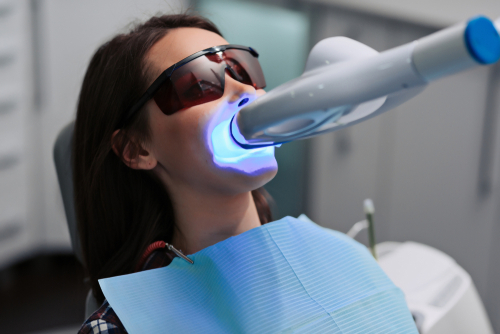
Solutions for Dealing with Tooth Sensitivity
August 1, 2023
Immediate Steps for Toothache Relief
August 22, 2023Top Tips for Maintaining Your Dental Implants

Top Tips for Maintaining Your Dental Implants
Top Tips for Maintaining Your Dental Implants – Dental implants are artificial tooth roots that provide a permanent base for fixed replacement teeth.
They’re an effective long-term solution for people who suffer from missing teeth, failing teeth, or chronic dental problems.
While dental implants mimic natural teeth, their maintenance requires some specific practices to ensure longevity. Proper care of dental implants is vital to their functionality and overall oral health.
This article will provide insights into understanding dental implants, daily oral hygiene practices, dietary considerations, avoiding damaging habits, dealing with potential problems, and the importance of overall oral health.
Understanding Dental Implants
Table of Contents
They function like natural teeth, allowing for comfortable eating, smiling, and speaking. Dental implants can last many decades, sometimes even a lifetime, with proper care and maintenance.
A common misconception is that dental implants require less care than natural teeth. To ensure their longevity, they need a similar, if not higher, level of care.
Daily Oral Hygiene for Dental Implants
- Use a soft-bristled toothbrush and gently brush your implants, just like natural teeth. Special brushes, like interdental brushes, can help clean hard-to-reach areas.
- Flossing is crucial in removing plaque around the implants. Special dental tape or floss can be used to avoid damaging the implant.
- Use low-abrasive toothpaste and alcohol-free mouthwash. Both should be specifically designed for dental implants.
Regular Dental Visits

Regular check-ups allow your dentist to monitor the implants and ensure they function properly. During a dental visit, your dentist will examine the implants, clean around them, and address any minor issues before they become serious.
People with dental implants should see their dentist every six months or as the dental professional recommends.
Dietary Considerations for Dental Implants
- Calcium-rich foods support oral health, while crunchy fruits and vegetables can naturally clean teeth and implants.
- Avoid hard, chewy foods and limit your intake of sugary and acidic foods and drinks, as they can build up plaque.
- Staying hydrated helps produce saliva, which naturally cleanses the mouth and maintains oral health.
Avoiding Damaging Habits
Habits like chewing on hard objects (pens, ice, etc.), teeth grinding, and smoking can damage dental implants.
Implement strategies like using a protective mouthguard, seeking help for quitting smoking, and mindfulness practices to manage stress-related grinding.
Smoking and excessive alcohol consumption can deteriorate bone quality, leading to implant failure.
Dealing with Potential Implant Problems
Common Signs of Implant Issues
Loosening of the implant, discomfort, inflammation, or difficulty chewing could indicate potential problems. If you experience any issues with your implant, contact your dental professional immediately for evaluation.
Your dentist can solve implant issues, ensuring your oral health isn’t compromised.
Importance of Overall Oral Health

- Healthy gums and teeth support the success and longevity of your dental implants.
- Regular brushing, flossing, and dental check-ups ensure the health of your entire mouth.
- Good oral health reduces the risk of systemic diseases like heart disease and diabetes, which can compromise the success of dental implants.
Long-term Care for Dental Implants
With time, implants might require adjustments or replacements of their external parts, depending on wear and tear.
Maintain regular dental visits, practice good oral hygiene, and lead a healthy lifestyle to ensure long-term implant health. Your dentist can guide you about the need for any upgrades or replacements to the implant components.
FAQs
How Do I Clean Around My Dental Implants?
Use a soft-bristled toothbrush, non-abrasive toothpaste, and floss designed for implants. A water flosser can also be effective.
Can Dental Implants Decay Like Regular Teeth?
No, dental implants can’t decay like natural teeth. However, they can still accumulate plaque and tartar, leading to gum disease.
What Happens If My Implant Feels Loose?
Contact your dentist immediately. The implant may need to be tightened or replaced.
Do Dental Implants Require Special Toothpaste or Mouthwash?
Use non-abrasive toothpaste and alcohol-free mouthwash to avoid damaging your implants.
How Long Will My Dental Implants Last With Proper Care?
Dental implants can last many decades or even a lifetime with proper care.
Top Tips for Maintaining Your Dental Implants – Conclusion

Proper dental implant care is crucial for their longevity and overall oral health. It ensures the comfort, functionality, and aesthetics of your dental implants.
Invest time and effort in maintaining your dental implants. Diligent oral hygiene practices ensure the longevity and functionality of your implants.
Well-maintained dental implants enhance your quality of life by providing a permanent solution for missing teeth, allowing you to eat, speak, and smile confidently.
Give your dental implants the care they deserve for a lifetime of smiles. Schedule your regular check-ups and follow a diligent oral hygiene routine!
Are you seeking a professional and reliable dentist in Singapore? Contact us today!




